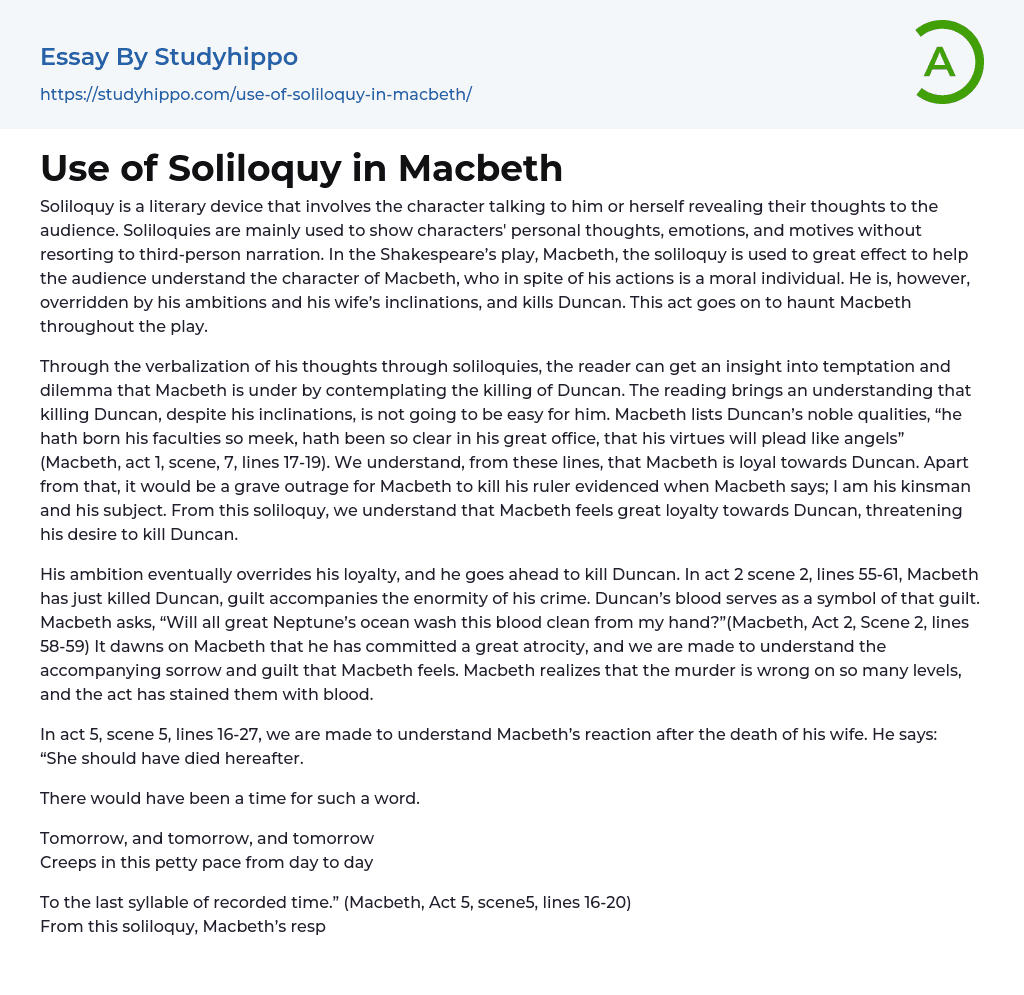Soliloquy is a literary device that involves the character talking to him or herself revealing their thoughts to the audience. Soliloquies are mainly used to show characters' personal thoughts, emotions, and motives without resorting to third-person narration. In the Shakespeare’s play, Macbeth, the soliloquy is used to great effect to help the audience understand the character of Macbeth, who in spite of his actions is a moral individual. He is, however, overridden by his ambitions and his wife’s inclinations, and kills Duncan. This act goes on to haunt Macbeth throughout the play.
Through the verbalization of his thoughts through soliloquies, the reader can get an insight into temptation and dilemma that Macbeth is under by contemplating the killing of Duncan. The reading brings an understanding that killing Duncan, despite his inclinations, is
...not going to be easy for him. Macbeth lists Duncan’s noble qualities, “he hath born his faculties so meek, hath been so clear in his great office, that his virtues will plead like angels” (Macbeth, act 1, scene, 7, lines 17-19). We understand, from these lines, that Macbeth is loyal towards Duncan. Apart from that, it would be a grave outrage for Macbeth to kill his ruler evidenced when Macbeth says; I am his kinsman and his subject. From this soliloquy, we understand that Macbeth feels great loyalty towards Duncan, threatening his desire to kill Duncan.
His ambition eventually overrides his loyalty, and he goes ahead to kill Duncan. In act 2 scene 2, lines 55-61, Macbeth has just killed Duncan, guilt accompanies the enormity of his crime. Duncan’s blood serves as a symbol of that guilt. Macbeth asks, “Will all great Neptune’s ocean wash
this blood clean from my hand?”(Macbeth, Act 2, Scene 2, lines 58-59) It dawns on Macbeth that he has committed a great atrocity, and we are made to understand the accompanying sorrow and guilt that Macbeth feels. Macbeth realizes that the murder is wrong on so many levels, and the act has stained them with blood.
In act 5, scene 5, lines 16-27, we are made to understand Macbeth’s reaction after the death of his wife. He says:
“She should have died hereafter.
There would have been a time for such a word.
Tomorrow, and tomorrow, and tomorrow
Creeps in this petty pace from day to day
To the last syllable of recorded time.” (Macbeth, Act 5, scene5, lines 16-20)
From this soliloquy, Macbeth’s response to the death of his wife is oddly reserved, given the great love that they shared. However, it turns into a speech of pessimism and despair. We understand how much the death of his wife and the acquisition of power by unseemly means has led to his deterioration. He insists that life has no purpose. Rather, “it is a tale, told by an idiot, full of sound and fury. Signifying nothing” (Macbeth, act 5, scene, 5, lines 25-27). We can understand how he would succumb to such pessimism after the death of his wife. This depression and despair are reflective of the regret that Macbeth feels after killing Duncan and rising to power.
Through these soliloquies, it helps to relate to Macbeth’s heightened sense of realization of his actions and their consequences. He understands the justness of everything that he is going through as Macbeth becomes consciously aware of everything that he has lost. He eventually decides that
his existence has no meaning. Through these expressions, we develop sympathy for Macbeth as the ill-fated hero of the play.
Work Cited
- Wilhelm D Jeffrey, Literature Texas treasures: British literature. Columbus, OH: Glencoe/McGraw-Hill, 2011. Print.




